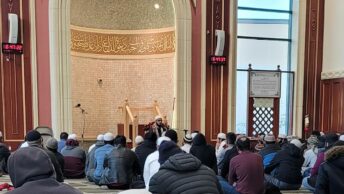Translation of an Excerpt from Imam Ibn Rajab al-Hanbali’s Lata’if al-Ma’arif
“God looks at His creation in the night of the middle of Sha’ban; He forgives all His creation except for one who associates partners with God or the one who has hatred or enmity for others.” (Ibn Majah, from Abu Musa, Allah be pleased with him)
From amongst the sins which prevent forgiveness [along with polytheism and other sins previously mentioned in earlier chapters] is enmity. This [enmity] is hatred or malice or rancor by a Muslim towards his brother [or sister] for personal reasons. Enmity prevents forgiveness in most occasions of mercy and forgiveness, as mentioned in Sahih Muslim from Abu Hurayra (Allah be pleased with him), from the Messenger of Allah (may God bless him and grant him peace), “The gates of paradise are opened on Mondays and Thursdays; every slave who does not associate partners with God is forgiven, except the man who has enmity between himself and his brother. It is said, ‘wait regarding these two until they reconcile.” Imam Awza’i (Allah have mercy on him) explained that this enmity which prevents forgiveness is for the one who has in his heart enmity towards the companions of the Messenger of God (may God bless him and grant him peace). There is no doubt that this type of enmity is a greater crime than having enmity for one another.
Awza’i (Allah have mercy on him) has [also] been narrated to have said, “Every person who bears enmity is an innovator who has separated from the community (ummah).” Likewise, Ibn Thawban said, “A person who bears enmity has left the path (sunnah) of the Prophet (may God bless him and grant him peace), is a denigrate upon the community and one who sheds their blood. So this enmity, meaning the innovative [type] of enmity, perpetually results in defaming the community of Muslims and regards their blood, wealth and honor as permissible [to shed, take and defame] – just like the innovation of the Khawarij, Rawafidh and the like.”
The best of actions
So the best of actions is having a sound heart from every type of enmity. The best of this is being free from the enmity had by the people of caprice and innovation resulting in them defaming the pious predecessors (salaf) and having rancor and hatred towards them, considering them to be disbelievers, innovators and people of deviation. Thereafter, not having enmity towards the general Muslims and wanting goodness for them, counseling them and loving for them what you love for yourself. Indeed God has illustrated the believers, generally, as those who say, “Our Lord! Forgive us and our brethren who have preceded us in Faith, and put not in our hearts any hatred against those who have believed. Our Lord! You are indeed full of kindness, Most Merciful.” (Hashr v10)
In the Musnad of Imam Ahmad (Allah have mercy on him), narrated from Anas, may God be pleased with him, indeed the Prophet of God, may God bless him and grant him peace, said to his companions on three consecutive days, “A man from the inhabitants of paradise will appear before you now.” A man appeared, Abdullah ibn ‘Umar, may God be pleased with him, accompanied him and spent three nights with him in order to observe his actions. He did not see him carrying out any great actions within his home and so informed him of the situation [of him being described as a man from the inhabitants of paradise]. He replied to Abdullah, “It is as you see, except I retire to sleep and there is nothing in my heart against anyone from the Muslims.” Abdullah ibn ‘Umar then said, “By this you have reached what you have reached (paradise).
In the Sunan of Ibn Majah, from Abdullah ibn ‘Umar, may God be pleased with him, “It was said, ‘O Messenger of God, who are the best of people?’ He, may God bless him and grant him peace, replied, ‘Every [possessor of a] sound heart and truthful tongue’. It was then asked, ‘We understand the “truthful tongue”, what are “sound hearts”. He, may God bless him and grant him peace, replied, ‘It is the purified, that which within there is no sin, hatred, rancor or envy.’”
Some of the pious predecessors said, “The best of actions is having a sound heart, generosity of the soul and to give sincere counsel to the community. By these traits, ranks are reached that are not achieved by excessive striving in fasting and ritual prayer.”
My brothers, leave the sins that prevents the slave from gaining forgiveness from his Oft-Forgiving Master during the periods of mercy, repentance and forgiveness.






